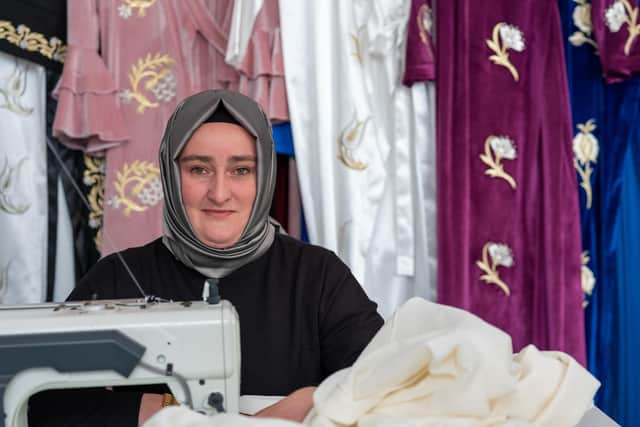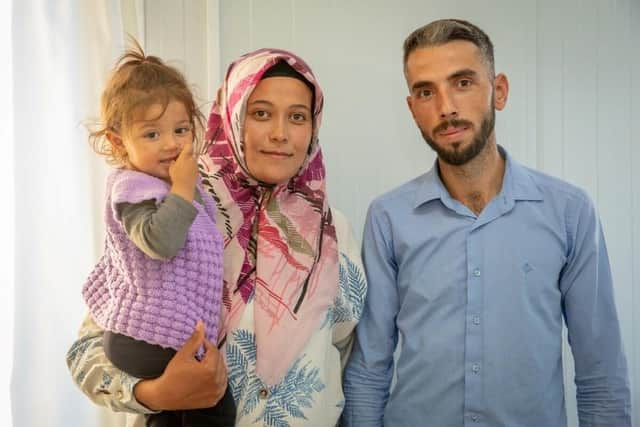Turkey-Syria earthquake one year on: 'Psychologically, we are always living with the fear of another earthquake'
When Mutaba tried to return to work after the devastating earthquake that struck southern Turkey and north-west Syria a year ago, she found it impossible to go into a large building.
“I worked in a fashion factory in Maraş, but after the earthquake I had a fear of being inside and of going to the factory,” she said. “I couldn't go, I'm scared.”
Advertisement
Hide AdAdvertisement
Hide AdA year on from the day the disaster hit, on February 6 last year, she still struggles with the psychological effects of the disaster.


"I can't overcome my fear; I can't stay in closed spaces,” she said. “So it was very difficult for me to go back to my work.”
The earthquake measured 7.8 on the Richter scale and killed at least 58,000 people across southern Turkey and north-west Syria. Nearly 18 million people were directly affected by the earthquakes across the two countries and at least 300,000 buildings were destroyed or badly damaged, leaving people living in the cold winter weather without proper shelter.
The population has since had to face floods and also extreme heat in southern Europe as the relief effort continues.
In Turkey, three million people have been displaced to other parts of the country. Many others are now living in overcrowded tents in camps and adapted shipping containers, according to a new report from the Disasters Emergency Committee (DEC). In Syria, around two million people are still living in camps and shelters in the area worst affected by the earthquake.


An emergency appeal to help victims of the disaster, run by DEC, has raised £13.4 million in Scotland alone and a total of £150m across the UK.
Fashion design graduate Mutaba, 33, lost her home in the earthquakes and lived in a tent for months. Now she is living in a shipping container with eight members of her extended family and takes part in a programme run by charity Oxfam to learn sewing and embroidery skills.
“Thanks to the instructors in the places we went, we managed to hold onto life again,” she said. “That's how we keep going.”
Advertisement
Hide AdAdvertisement
Hide AdFather-of-two Murat was similarly affected. He had also been working at a textile factory when the earthquake struck, and the factory collapsed, trapping him inside. He heard his colleagues crying in pain as he managed to crawl out of the rubble.
“In the first hours, when the earthquake hit first, all the lights went out,” he said. “I didn’t know the extent of the destruction. I saw it when I got out. My family was on my mind.”
His wife, Elif, and their two children were unhurt in the earthquake. However, the young family was forced to sleep in their car for three days before moving in with relatives in a village, where ten families lived together in one small house.
Now, they live in a container in a camp in Kahramanmaras, where Murat, who has been diagnosed with post-traumatic stress disorder (PTSD) and is receiving counselling, is working in the camp, where he is responsible for the storage of relief items and delivering aid to families. The family is also receiving cash aid of around £88 a month on a card provided by the British Red Cross and now funded by DEC. With the aid, they can buy clothes and food at specified markets and shops.
“After I started this job and I pulled myself together, I started to continue my education again through a friend here,” he said. “I'm now working for my exams. After I complete my education, I will do whatever is required for the good of my people and the country.”
Murat added: “Psychologically, we are always living with the fear of another earthquake.”
In neighbouring Syria, Farida had already been living in a tent for three years when the earthquake struck, after previously being forced to flee her home to escape heavy bombing from the ongoing civil war. Before the earthquakes, around 60 per cent of people in north-west Syria had been forced to leave their homes to avoid conflict.
The family eventually settled in a refugee camp in a nearby city, where she and her husband, Ahmed, lived in a tent next door to two of their sons, spending time with their young grandchildren. When the earthquake hit, she saw the dirt floor of her tent crack underneath her.
Advertisement
Hide AdAdvertisement
Hide Ad"When the ground shook at dawn on February 6, I woke up in horror as I saw the floor of the tent cracking,” she said. “The simple possessions we had were vulnerable to destruction. I felt a double fear of having to flee again, but this time there was no safe place.”
Residents of the camp had nowhere to go and have remained in their tents. However, Farida and Ahmed’s health has deteriorated due to the stress of the situation. Medical care provided by charity Hope Revival Organization has allowed them to access healthcare, despite not being able to walk to local clinics.
Farida, 52, has hope that one day her family will be able to leave the camp.
“I dream that one day I will return to my home, that all my children will return, and that my neighbours will return to our village after the war ends and we all live in peace again," she said.
Jamie Livingstone, head of Oxfam Scotland, said: “A year on, with many families still living in tents or shipping containers, Scottish donations continue to support everyday life in camps, from repairing damaged water supplies to providing blankets and hygiene kits. The road to recovery will be long, but thanks to the public’s generosity, communities in Turkey and Syria won’t have to walk it alone.
“In what can often feel like a fractured world, the people of Scotland proved once again that compassion knows no borders; and that while we may be a small nation, we have a big heart.”
Comments
Want to join the conversation? Please or to comment on this article.
